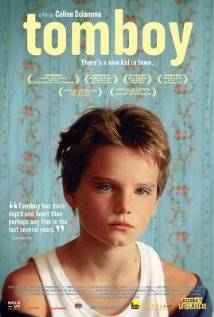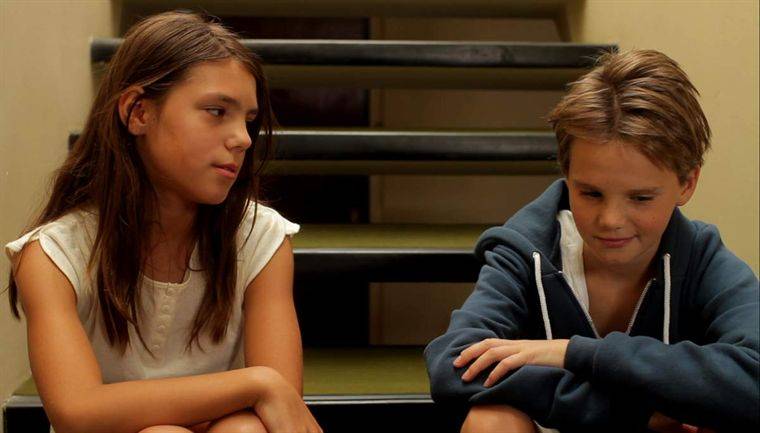 Céline Sciamma‘s story follows 10-year-old girl Laure (Zoé Héran) as she seeks friends in her new town. However Laure has made friends as Mikael, a 10-year-old boy. It’s not explained clearly, but we get the impression that Laure’s gone through this before. It’s complicating the inherently complicated.
Céline Sciamma‘s story follows 10-year-old girl Laure (Zoé Héran) as she seeks friends in her new town. However Laure has made friends as Mikael, a 10-year-old boy. It’s not explained clearly, but we get the impression that Laure’s gone through this before. It’s complicating the inherently complicated.
Laure and Mikael only exist as a single person to Laure/Mikael and to her sister, Jeanne, the quintessential little girl. Jeanne is inquisitive, silly, and the ideal little sister that Mikael can help protect.
Laure’s experiences at home are those of traditional father-son bonding opportunities: learning to drive, getting newly painted blue bedroom walls, and even trying beer for the first time. She doesn’t try to be boy or girl but just herself. And she recognizes that self to be male.
The girls’ mother has a baby boy on the way, which poses another barrier to Laure’s identity and her role within the family. She now functions as more of a big brother to Jeanne than an older sister and that suits them both just fine. But how will a new son affect those relationships?
Sciamma’s film is a sincere, endearing, and often funny, despite its label as a drama. Mikael’s anxiety and discomfort is palpable in several scenes, including a shirts-versus-skins soccer match. It’s a similar feeling that even I could relate to, growing up as a chubby little boy who didn’t want to get made fun of for having “boobies.” After all, everyone has something they’d rather keep to themselves and sometimes a shirt will suffice in the interim.
But Laure is quick to rise to the challenges she faces living her double life as Mikael. Her gears are perpetually turning as she studies herself in the mirror each evening at home trying to prepare to sustain the next illusion. As Mikael she sheds her fears, learning to run, kick, high five, fight, and spit like the rest of the boys. Her biggest test comes with a trip to the lake to swim and some “alterations” need to be made in advance for Mikael to be present. She is always in Mikael’s head.
Héran is wonderful in a role that doesn’t require her to speak much through either of her identities (I’d say personas, but those do not seem to have any sort of disconnect). She is authentic and easy to recognize as the deeply sensitive boy that she exudes. And her developing relationship with Lisa, a girl who becomes her best friend and girlfriend, is a mutual attraction. But it is only Mikael who knows that he cannot sustain it in a lie. Summer will end eventually and the school roster will call for Laure’s presence, reducing Mikael to a repressed alter-ego and Laure to a liar and outcast. Who will stick with her when she is still Mikael but referred to as her birth name Laure?
All of these issues could break anyone, but pre-pubescent Laure is strong, even if she does have to cry from time to time. But boys do cry; and so can a little girl who is, in her heart, just one of the boys.
3.5/4 stars
– J. Stanley
—
Life is beautiful and complicated in Céline Sciamma’s Tomboy. Her young protagonist, 10-year-old Laure, is blue-eyed, freckled, and thin as a rail. She has short, choppy hair and wears baggy shorts and narrow-fitting tees. She is the opposite of her 6- year-old sister, Jeanne, who seems to be, as the nursery rhyme goes, “made of sugar and spice and everything nice.” Jeanne is extremely comfortable with herself, not merely “playing” the part of the ballerina in the frilly tutu, but embracing it whole-heartedly. But Laure is harder for us to know. She does not fit into a ready-made mold. And she knows it.
The plot begins with the family’s move to a new apartment complex. It’s summer and the sisters are left to their own devices. Their father is away working much of the time and their very pregnant mother is in bed. Jeanne easily entertains herself with dancing and drawing, but Laure sees other children her own age outside, playing. So she goes out to make some friends. When asked her name, Laure replies “Mikael.” We don’t know why she says it or if she planned to say it. But what happens next is a series of sweet, poignant moments that examine that fragile time in youth when you start seeing yourself, and those around you, differently.
I loved this film for taking the weighty issue of gender roles and sexuality and creating a beautiful, moving piece that confronts us, but also let’s us breathe. At several times in the movie I felt myself growing worried. I was sure something very dastardly was about to happen, but then would be pleasantly pleased to be wrong. I really put myself in Laure’s place. I could feel the cogs in my brain working along with hers, struggling to keep this illusion in place for just another day, another day, another day.
Zoé Héran, who plays Laure, gives an amazing performance. Even with her taciturn character, she expresses so much inner contemplation. The other child-actors in the film are equally engaging and make you forget there is a script at all. This film sheds light on an often over-looked topic. I believe the more we understand about one another, the less differences we’ll find. This is a story that reminds us that life is complicated. This is also a story that teaches there is hope
4/4 stars
-E. Benoit
Tomboy is part of the Reel It UP LGBT Film Festival, and is showing Saturday, June 9, at 1:05 p.m.. For more information about the festival, go here.








